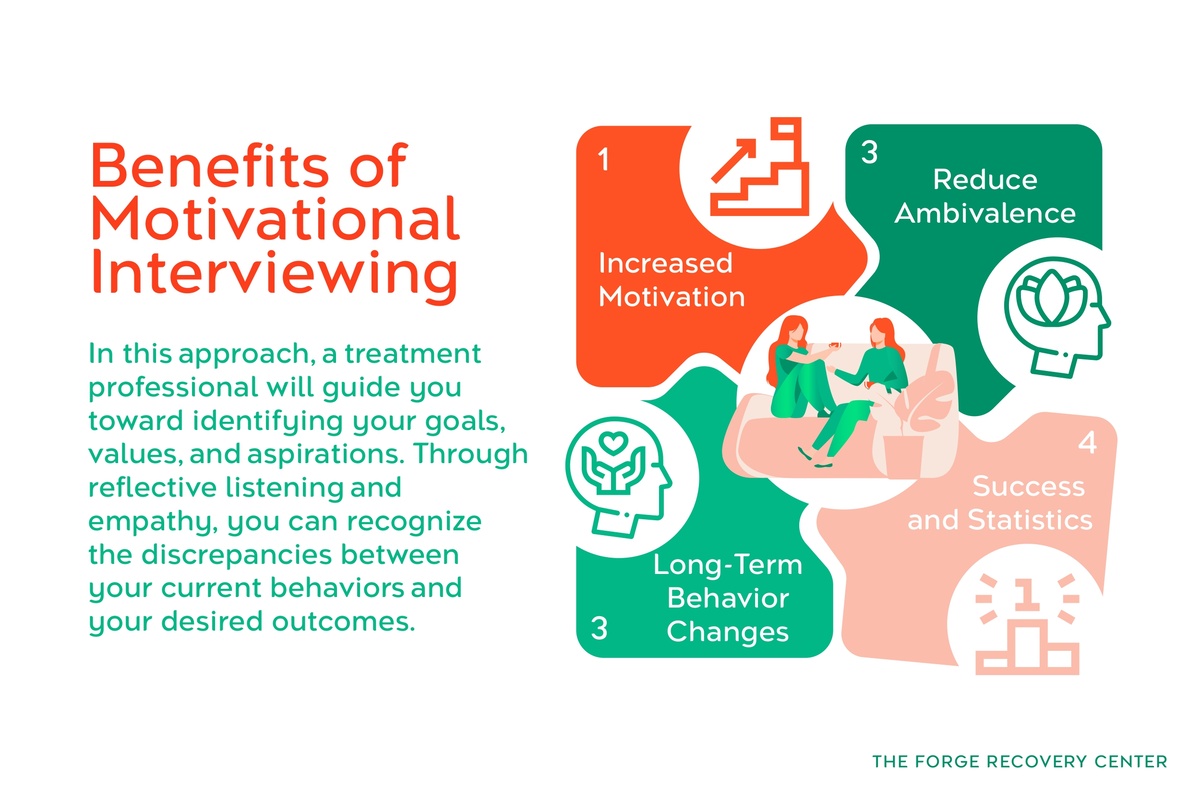Motivational Interviewing: A Holistic, Introspective Treatment Approach


Motivational interviewing is a holistic route to overcoming mental health and substance use disorders, working by unlocking your inner motivation to enact positive change. Learn more about how motivational interviewing works and what to expect, and contact The Forge Recovery Center if you or a loved one can benefit from this unique treatment modality.
What Is Motivational Interviewing?
Motivational Interviewing is a counseling approach that helps individuals explore and resolve their ambivalence toward change. It is a collaborative, goal-oriented method of communication that aims to strengthen a person's motivation for positive behavior change. By using open-ended questions, reflective listening, and affirmations, motivational interviewing encourages individuals to identify their own reasons for change and empowers them to take steps toward achieving their goals.
This approach is often used in healthcare settings, addiction treatment, and other fields where behavior change is necessary. Overall, motivational interviewing is a valuable tool for supporting individuals in making sustainable changes in their lives.
Primary Goals
When it comes to motivational interviewing, its primary goals are to enhance motivation and empower individuals to make positive changes. By using open-ended questions, affirmations, reflections, and summaries, motivational interviewing aims to explore ambivalence and strengthen intrinsic motivation.
In this approach, a treatment professional will guide you toward identifying your goals, values, and aspirations. Through reflective listening and empathy, you can recognize the discrepancies between your current behaviors and your desired outcomes. This process fosters self-awareness and increases motivation for change.
The importance of goal-oriented communication in motivational interviewing lies in its ability to align individual goals with action plans. By focusing on what matters most to the individual, it facilitates a sense of ownership over the change process. This tailored approach enhances commitment and persistence toward achieving personal objectives.
Goal setting: Establish clear, achievable goals with measurable outcomes.
Action planning: Develop specific steps to reach those goals effectively.
Monitoring progress: Regularly review achievements and setbacks to adjust strategies accordingly.

What Can Motivational Interviewing Treat?
Motivational interviewing can be employed to treat a wide range of conditions, from substance use disorders and mental health struggles to behavioral changes, healthcare adherence, and more. Here’s an overview of the conditions commonly treated by MI:
Substance Abuse & Addiction
Motivational interviewing is used to treat a number of substance use disorders, such as cocaine addiction, and is a crucial part of drug rehab treatment. When dealing with substance abuse and addiction, motivational interviewing can serve as a powerful tool. It can help you explore your ambivalence towards change, leading you closer to recovery. By fostering intrinsic motivation, it supports you in making positive decisions regarding your substance use. The empathetic and non-confrontational nature of motivational interviewing makes it an effective component of addiction treatment.
Mental Health Struggles
In addressing mental health struggles like anxiety or depression, motivational interviewing can encourage self-reflection and enhance self-efficacy. It assists you in identifying your values and goals, paving the way for overcoming mental health challenges. Through active listening and reflective questioning, motivational interviewing offers a compassionate approach to supporting individuals with mental health issues.
Behavioral Changes
Motivational interviewing is instrumental in facilitating behavioral changes by helping you resolve ambivalence and build confidence in your ability to change. It encourages the exploration of personal values and goals, leading to sustainable behavior modification. Through collaborative goal-setting and feedback, motivational interviewing promotes positive behaviors effectively.
Weight Management
Motivational interviewing also proves beneficial in assisting individuals in achieving their weight-related goals. By focusing on intrinsic motivation and self-determination, it can help you make lasting lifestyle changes for sustainable weight loss. The supportive and empowering nature of motivational interviewing serves to ensure adherence to weight management strategies.
Chronic Illness Management
In managing chronic illnesses, motivational interviewing serves as a valuable tool in promoting behavioral changes that improve health outcomes. It aids individuals in setting realistic goals and implementing strategies to manage their conditions effectively. By fostering autonomy and self-efficacy, motivational interviewing enhances the overall quality of life for those with chronic illnesses.
Healthcare Adherence
Promoting healthcare adherence, motivational interviewing emphasizes the importance of engaging patients in their healthcare decisions actively. It facilitates open communication between healthcare providers and patients, leading to better adherence to treatment plans. By addressing barriers to adherence through collaborative goal-setting, motivational interviewing improves patient outcomes significantly.
Are You Struggling with Mental Health or Addiction?
We Can Help. Call Us Now!
CALL: 877-839-1772
How Motivational Interviewing Works
During motivational interviewing, a drug or alcohol addiction treatment professional utilizes various techniques to guide individuals toward positive behavioral changes. Reflective listening is a key technique where you mirror back what the person has said, showing empathy and understanding.
In addition to reflective listening, open-ended questions are crucial in motivational interviewing. By asking open-ended questions, professionals encourage you to elaborate on your thoughts and feelings, fostering self-reflection.
Utilizing affirmations is another essential technique in motivational interviewing. Affirmations involve acknowledging the individual's strengths and efforts, boosting confidence and motivation to make positive changes.
Principles of Motivational Interviewing
Motivational interviewing is guided by three core principles: collaboration between patients and interviewers, evocation to identify reasons for change, and autonomy. Let’s explore what these principles mean in the context of treatment and why they matter:
Collaboration
Collaboration is key in motivational interviewing. Working together with individuals fosters trust and engagement. By partnering with clients, you create a supportive environment for change.
In motivational interviewing, collaboration enhances the effectiveness of the process. It empowers individuals to explore their motivations openly. Through collaboration, professionals can guide motivational interviewees toward positive behavioral changes.
The partnership aspect of motivational interviewing emphasizes respect for autonomy. It involves working alongside individuals rather than directing them, and encourages clients to take ownership of their decisions.
Evocation
Evocation in motivational interviewing focuses on drawing out individuals' own motivations and reasons for change. It involves eliciting thoughts and ideas from clients regarding their goals. By evoking change talk, treatment professionals can help individuals express their desires for a better future.
Evocation plays a crucial role in identifying and amplifying intrinsic motivation. By exploring personal values and priorities, meaningful behavioral shifts can be identified and solidified. This process allows individuals to connect their actions with their core beliefs.
Drawing out the person's priorities and values through evocation helps create a sense of purpose. It enables individuals to see the relevance of change to their own lives. By highlighting these connections, professionals aim to help you strengthen your commitment to transformation.
Autonomy
Motivational interviewing places a strong emphasis on autonomy. It acknowledges that individuals have the capacity to make choices about their behavior, and respects your self-determination in overcoming a given condition or struggle. This focus on autonomy helps foster a sense of responsibility for one's actions.
Autonomy plays a vital role in fostering intrinsic motivation within individuals. By allowing you to make informed choices based on your values, treatment professionals promote lasting change. Ultimately, encouraging autonomy in decision-making empowers individuals to pursue meaningful goals.
Are You Struggling with Mental Health or Addiction?
We Can Help. Call Us Now!
CALL: 877-839-1772
Motivational Interviewing: What to Expect
It’s important to know what lies in store before proceeding with motivational interviewing. To clear any confusion and give you an idea of what’s ahead, here’s a quick overview of how sessions tend to proceed:
Structure Overview
During a motivational interviewing session, you can anticipate a structured yet flexible approach. Sessions usually begin with the therapist establishing rapport and setting the agenda. This is followed by exploring your thoughts, feelings, and motivations related to change.
The conversation in a motivational interviewing session typically flows organically, guided by your responses. The therapist or treatment professional will use open-ended questions to delve deeper into your ambivalence about change. Reflective listening plays a crucial role, with the therapist summarizing and affirming your statements.
Collaborative Atmosphere
In motivational interviewing, expect a collaborative atmosphere where you and the therapist work together toward identifying and resolving ambivalence. The focus is on empowering you to find intrinsic motivation for change rather than imposing external solutions.
The non-confrontational nature of motivational interviewing means that the therapist avoids arguments or direct persuasion tactics. Instead, they aim to evoke self-motivational statements from you through empathy, support, and understanding.
Key Elements
Establishing rapport and setting the agenda
Exploring thoughts, feelings, and motivations for change
Organic flow guided by open-ended questions
Reflective listening for summarizing and affirming statements

Benefits of Motivational Interviewing
Motivational interviewing can carry several key benefits, from sustained motivation to long-term behavior changes that can address addiction and mental health struggles. Here’s a quick summary of the benefits that await you:
Increased Motivation
When you engage in motivational interviewing, you are more likely to experience increased motivation. The collaborative and goal-oriented nature of this approach helps boost your motivation by exploring your own reasons for change. By actively involving you in the decision-making process, it empowers you to take ownership of your goals.
In motivational interviewing, the focus is on enhancing your intrinsic motivation for change. This means that instead of relying solely on external factors or pressures, you are encouraged to tap into your internal drive and values. Through reflective listening and open-ended questions, the interviewer helps you uncover your own motivations, making them more compelling and personal.
The positive impact of motivational interviewing on motivation levels is significant. By fostering a supportive and non-confrontational environment, this approach allows you to explore ambivalence without judgment. This process can lead to a deepened understanding of your motivations, ultimately increasing your readiness to make positive changes.
Reduced Ambivalence
Motivational interviewing plays a crucial role in reducing ambivalence by acknowledging and addressing conflicting feelings within you. By recognizing that change is a process characterized by uncertainty, motivational interviewing helps you navigate through these mixed emotions. It provides a safe space for you to express doubts and concerns while working towards resolution.
The techniques used in motivational interviewing to resolve ambivalence include techniques such as open-ended questions, affirmations, reflections, and summaries (OARS). These strategies allow you to explore both sides of the change equation while guiding you toward a clearer direction. By encouraging self-reflection and exploring discrepancies between your current behaviors and values, ambivalence can be effectively addressed.
Long-Term Behavior Changes
Motivational interviewing supports long-term behavior changes by focusing on intrinsic motivation and sustainable goals. Instead of quick fixes or temporary solutions, this approach emphasizes the importance of lasting transformations. By aligning your goals with your values and priorities, motivational interviewing sets the stage for meaningful behavioral modifications.
The effectiveness of motivational interviewing in promoting lasting behavioral changes lies in its emphasis on autonomy and self-efficacy. By empowering you to make informed decisions based on your own values, this approach fosters a sense of ownership over your actions. This empowerment leads to sustainable behavior change that is driven by internal motivations rather than external pressures.
Success & Statistics
When it comes to effectiveness, motivational interviewing boasts impressive statistics. In one study, researchers found that motivational interviewing was effective for 75% of participants, and significantly effective overall compared to traditional methods alone. MI has also been found to reduce the extent of substance abuse when compared to no intervention and to support mental health treatment plans.
Are You Struggling with Mental Health or Addiction?
We Can Help. Call Us Now!
CALL: 877-839-1772
How to Get Started
If you’re ready to get started with motivational interviewing, it starts with finding a qualified practitioner. Here are our tips for getting started with MI:
Find a Practitioner
When seeking a practitioner for motivational interviewing, start by researching professionals in your area. Typically, motivational interviewing is held in community agencies, clinical settings, hospitals, or treatment centers. While MI is typically carried out by drug and alcohol addiction counselors, the approach is also used by doctors and other healthcare professionals. Consider their experience and track record in helping clients achieve their goals, and ensure that they have a good understanding of the techniques and principles of motivational interviewing.
Choosing the right practitioner is essential as it directly impacts the effectiveness of motivational interviewing sessions. A skilled and empathetic practitioner can create a supportive environment that encourages open communication and positive change. Their expertise can guide you through the process of setting achievable goals and overcoming obstacles on your journey toward personal growth and development.
Prepare for Sessions
Before attending motivational interviewing sessions, take time to reflect on your motivations, challenges, and goals. Write down what you hope to achieve through motivational interviewing and any specific areas you want to focus on during sessions. Consider how you can actively participate in the process by being open-minded and willing to explore new perspectives.
Create a checklist of things to bring or prepare before each session, such as relevant documents, notes on progress, or questions for the practitioner. Being organized and ready for each session helps maximize the benefits of motivational interviewing by allowing you to stay focused on your objectives and engage fully in the process.
Readiness and openness are key factors in preparing for motivational interviewing sessions. By acknowledging your readiness for change and embracing new insights, you set yourself up for a transformative experience that can lead to lasting behavioral changes. Approach each session with an open mind and willingness to explore different viewpoints to make the most out of your motivational interviewing journey.
Consider a Treatment Center
When considering options for motivational interviewing, treatment centers offer a structured environment that supports holistic healing and personal growth. Treatment centers provide access to multidisciplinary teams consisting of therapists, counselors, nutritionists, and other professionals who collaborate to address various aspects of an individual's well-being.
Treatment centers enhance the delivery of motivational interviewing by offering specialized programs tailored to meet individual needs. These programs may include group therapy sessions, educational workshops, experiential activities, and ongoing support services that complement traditional motivational interviewing approaches. The comprehensive support available at treatment centers creates a nurturing atmosphere conducive to personal transformation and sustainable lifestyle changes.

Closing Thoughts
You have now gained a comprehensive understanding of motivational interviewing, its applications, principles, benefits, and success rates. By exploring how motivational interviewing works and what to expect from it, you are equipped with valuable insights into this effective therapeutic approach. Understanding the core principles and statistics surrounding motivational interviewing can help you appreciate its significance in fostering positive change.
Now that you have a solid foundation in motivational interviewing, consider incorporating these techniques into your professional or personal interactions. Whether you are a healthcare provider, counselor, or simply seeking to motivate others effectively, implementing motivational interviewing strategies can lead to more successful outcomes. Embrace the power of motivational interviewing to inspire change and empower those around you.
Are You Struggling with Mental Health or Addiction?
We Can Help. Call Us Now!
CALL: 877-839-1772
Motivational Interviewing at The Forge Recovery Center: Start Healing Today!
Motivational interviewing is a unique treatment modality that can help individuals holistically overcome substance addiction and manage mental health conditions. At The Forge Recovery Center, we believe in the transformative power of this approach. Our dedicated team of professionals at our addiction center in Southern California is trained in motivational interviewing techniques, tailoring treatment plans to the unique needs and goals of each individual. If you or a loved one could benefit from motivational interviewing, we urge you to reach out.
Contact us today to learn more about our motivational interviewing services and start your journey toward recovery and growth.



